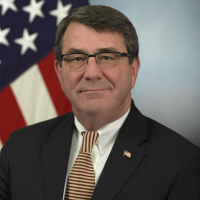Defense Secretary Says He’s Against “Back Doors” Into Encrypted Devices
 Defense Secretary Ashton Carter
Defense Secretary Ashton Carter
By Nicole Perlroth, New York Times News Service
SAN FRANCISCO — Defense Secretary Ashton Carter assured an audience of computer security experts Wednesday that he was not in favor of a “back door” that would give the government access to data that is protected by encryption.
Speaking at the annual RSA Conference, Carter sought common ground with companies worried by Apple’s fight with the Federal Bureau of Investigation (FBI) over access to an iPhone.
“Just to cut to the chase, I’m not a believer in back doors or a single technical approach,” Carter said to loud applause during a panel discussion at the conference. “I don’t think it’s realistic. I don’t think that’s technically accurate.”
Apple is resisting a court order that would require it to create software to break the password mechanism in an iPhone used by one of the assailants in the December mass shooting in San Bernardino, California.
The FBI argues that it is not asking for any sort of permanent back door and is merely asking for help in circumventing a single phone’s password protection. People in the tech industry worry, however, that the request for help in the San Bernardino case is merely a prelude and point to a number of other pending cases in which law enforcement authorities would like Apple’s assistance.
The software Apple is being asked to create could be considered a back door because it could provide special access to information that would otherwise be inaccessible thanks to passwords or encryption.
Carter’s comments, though short on specifics, highlight the challenges various government agencies will face as they seek cooperation from Silicon Valley as the court fight between Apple and the FBI continues.
Also Wednesday, Carter said Alphabet’s executive chairman, Eric Schmidt, would head a new Defense Innovation Board to help connect tech companies and entrepreneurs with various Pentagon initiatives. And he announced a Hack the Pentagon initiative, which would reward hackers who find and turn over vulnerabilities in the Pentagon’s computer systems.
“I don’t think we ought to let one case drive a single solution,” Carter said, referring to the FBI-Apple dispute. “We have to innovate our way to a sensible result. And we need to do that because you can easily think of alternatives. One is a law written by people who don’t have the technical expertise, one written in anger or grief, and that’s not likely to work.”
Many at the conference have compared the FBI’s software request — some are even calling it “GovtOS,” short for government operating system — to asking journalists to write a false article, or turn over a source, on national security grounds.
Dan Kaminsky, a well-known security researcher, likened the government’s approach to persecuting firefighters during a firestorm. The point being, he wrote in an article on Wired.com, that at a time when data breaches happen regularly, the FBI is trying to force Apple to weaken the security of its phones instead of advocating stronger security.
Carter echoed the need for stronger security but avoided taking a side in the FBI-Apple dispute.
“The problems of data security are many,” he said. “There isn’t going to be one answer. There are lots of different parts to this.”
If Silicon Valley and Washington cannot find some alternative solution through innovation, Carter added, the most likely result would be a poorly written law, “or a solution written by China or Russia.”
“And you know what their view of data access and security is,” he said.
To Learn More:
Computer Hackers Wanted…by the Pentagon (by Lolita C. Baldor, Associated Press)
Homeland Security Joins Civil Libertarians in Seeing Privacy Threat from Cybersecurity Bill (by Noel Brinkerhoff and Steve Straehley, AllGov)
Senate Intelligence Committee Approves “a Surveillance Bill by another Name” (by Steve Straehley, AllGov)
- Top Stories
- Unusual News
- Where is the Money Going?
- Controversies
- U.S. and the World
- Appointments and Resignations
- Latest News
- Trump Orders ICE and Border Patrol to Kill More Protestors
- Trump Renames National Football League National Trump League
- Trump to Stop Deportations If…
- Trump Denounces World Series
- What If China Invaded the United States?






Comments